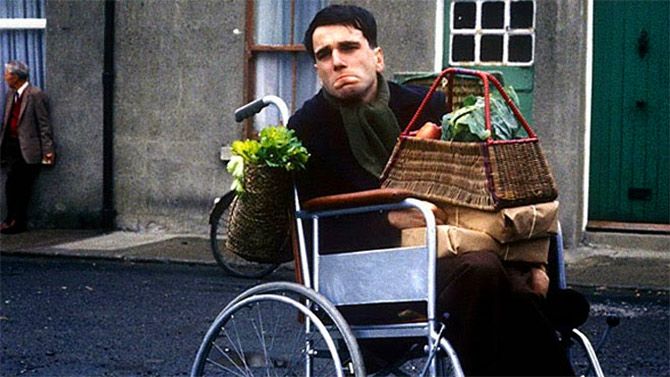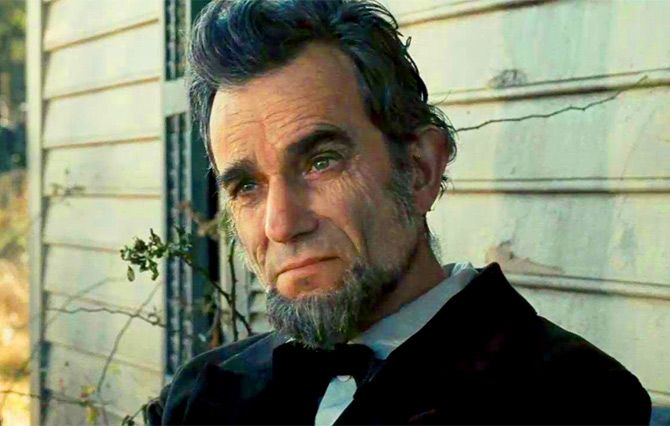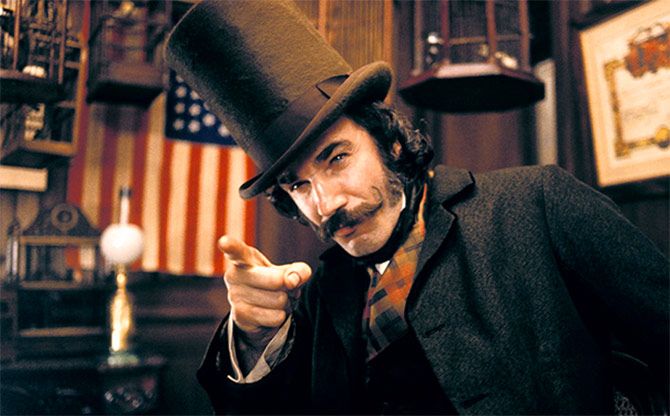The key to every Daniel Day-Lewis performance was a big theme and a thousand details.
And in the final phase of his acting career, says Sreehari Nair, America became his big theme, and the details... well, he just popped them out like waffles.

As he gets ready to leave, I must mention a few casualties of Daniel Day-Lewis' greatness: In Memoriam then -- all those hats in There Will Be Blood that did not belong to his character Daniel Plainview; all the decors and lilies in The Age of Innocence; all the dirty laundry in My Beautiful Laundrette; and just about all of his co-actors from The Gangs of New York.
A tablecloth in My Left Foot seemed absent from the scene, before, in a fit of rage, Day-Lewis grabbed at it with his teeth and held it in his mouth. It was a moment of true glory for the tablecloth.
No other actor, in the last 30 years, has commanded audience attention like Daniel Day-Lewis has; however, if there was a danger about his presence, it was that he could trim a scene down to his own outline.
The physical typicalities of Day-Lewis' characters -- erect posture, crippled posture, the wisdom-hunch, the upturned nose, the supple sexuality -- often burst before your eyes like peaches before these characters said as much as a word.
A classic Day-Lewis performance almost always began by him marking out his place in a film, and ended with him lording over it.
Decorated with an ability to blur out everyone and everything else in the frame, Day-Lewis remained an actor who never backed away -- not even when Ben Kingsley as Gandhi looked at his racist face and said to him in one breath, 'You'll find there's room for all of us here.'
If one were to analyse objectively, he was essentially from another era (in his head, he was always competing with those pure practitioners of Stanislavsky's The Method).
In an age of finesse-performers and heart-warmers, it was this anachronism about his approach that made the actor such a go-to for roles that contained a certain tragic force.

When, as Gerry Conlon in In the Name of the Father, he seethed and cried out to the police, 'I don't hate you. Give me the f****** statement. Give me a f****** pen,' he spoke for all our humiliations and compromises. It was the poem of the wronged, of those unfairly holed up in the jails, of those who have had their voices stifled in meetings, their enthusiasms undercut, of those who had been denied their just desserts.
The great daring in Daniel Day-Lewis's finest turns was that in his desire to be immediately exciting, he was also risking some of the worst assessments that could be loaded against an actor -- hamming, theatricality, and overbearance.
And the great triumph of his career was that he constantly had the needle pointing at a state of heavily charged emotional electromagnetism, without it ever crossing into the territory of mannered acting.
Don't think there's ever been a better actor for pulling you inside his characters with a little dressing up he did to their outsides.

In My Left Foot, every emotional trigger introduces in Christy Brown a different kind of convulsion.
When his therapist says she can help him swear better, he laughs as if tickled by her sales pitch.
Later, when Christy Brown realises the therapist is getting married and not to him, his embarrassment manifests as convulsions that combine with heavy breathing.
He's finally swearing better, only by shedding the courtly reserve he had imbibed in her company.
If there was an essence Daniel Day-Lewis picked up from The Method School of Acting, it was to connect his character's every gesture to something deep-rooted about the character's history, bad habits, excesses, drives, shames, and moment-to-moment confusions.
In My Beautiful Laundrette, from the time he runs into Omar, Johnny's divided spirit becomes evident: he's now acting out the rituals of a thug life all the while fighting the tenderness that's bubbling up inside him.
But then Day-Lewis doesn't stop there; he also conveys the frustrations of a man screwed over twice, first by his natural society and then by the immigrant community.
He doesn't play the two sides against each other -- just watches and makes love.

If his lovemaking in Laundrette is entrenched in commitment, it is an act of exploration in The Unbearable Lightness of Being.
He makes us understand that great sex with a great woman can be our way into the world. He still isn't backing away, but stays there as a gentle equal, playing the sophisticated clown, walking on his hands as Juliette Binoche pulls him out of his chair and into her lightness.
It was in The Being that he was asked: 'You want to see America?'
His reply, delivered from behind the armour of a bedsheet, suggested he was thinking about it.
Born to a Jewish mother and an English father (a poet-father whose ghost Day-Lewis claimed he had seen while playing Hamlet at the National Theatre, London), Daniel Day-Lewis may have been trained in the British school of classical acting, but his heroes were always American.
To Laurence Olivier's joke about Method Acting, he had once said with all his British graciousness, 'Without any disrespect to Olivier, he's missing the point there.'
It was not the weightlessness of Olivier, but the dodgy seductiveness of Clift, of Brando, of De Niro that led him to dedicate the last third of his acting career to reaching the very marrow of America. And he may have been so good as to deserve a face on the Rushmore.
When the veins on his forehead stood up as he screamed, 'I have abandoned my child. I have abandoned my boy,' he turned There Will Be Blood into a story of Judas lured by the spoils of capitalism.
There he was, the betrayer recast, those barrels of oil as his 30 silver pieces, and America, the Jesus he'd let down.
In The Gangs of New York, he gets at the Basic American Conundrum: Americans want to be rich and powerful, but once they become all that, their Christian side takes over and guilt peeps in.
Billy the Butcher is evil, but he's an American evil; so when he talks about 'the priest he buried in his own blood,' his voice goes down, and he offers him his biggest salute: 'This was a great man!'
Billy is Oedipus who gouges out his own eyes; *he is America*, and his mortifications are naturally hers, and he shields his sight to shield her.

As we were slowly beginning to assent to his violent discharge of emotions, Day-Lewis gave us in Lincoln a character that was all whispers and smears: His strength hidden behind his closed eyes and tired shoulders.
Day-Lewis' Lincoln wasn't just a glorified historical icon, but a primitive warlord raised to the highest refinements; someone who could narrate a juicy tale and smack his lips between punchlines just as well as he could bring a political convention that was going off-track, back into total order with a thump of his hand.

The key to every Daniel Day-Lewis performance was a big theme and a thousand details.
And in the final phase of his acting career, America became his big theme, and the details... well, he just popped them out like waffles.
Not all great actors have been blessed with universal acclaim, but Daniel Day-Lewis was.
A lover of Kabuki, a Mime expert, a Ballet instructor, a connoisseur of the Theatre, a Hindi movie aficionado, and a starry-eyed Hollywood kiddo could all appreciate his craft; for he had that innate ability to discover something very basic about his characters, and then give it shadings and echoes.
'Staying in Character' was such an immutable dharma for Lewis that one can't help but wonder if he had to strive really hard for character-continuum when a scene was stitched together using, say, an alternating series of medium and close-up shots.
Wouldn't the director's yelling of 'Cut' have often frayed his nerves?
What if his finest pouring out of his juices -- the best he could give to a shot, the best any actor could -- turned out to be an improperly lit shot, so then he would have to go about redoing the whole thing?
Surely there would have been times when the technique of cinema must have felt too puny to be compared to Day-Lewis's prodigious skills.

The above questions bother me and to them I add a few more: How do I make this piece not sound like an obituary?
Is an actor's hanging up of his gloves -- his decision to live a non-actor life --- equivalent to his death?
Or is Daniel Day-Lewis's retirement just the bubble bath that the burning Method Actor needed to keep him away from exploding?
The tragic reality of Method Acting (and why actors like De Niro today prefer a life of entrepreneurship as opposed to digging deep) is that the ambition of the Method Actor is too huge to be even confined to the usual definitions of the word 'Ambition' -- it's a crazy, irrational, low-profit, loss-risking take on the word Ambition.
And while that ambition draws from a curiosity for life (for life with all its illicits considered), it requires the actor to feed himself to his every role.

Daniel Day-Lewis's generosity as an actor was a readiness to become a full-course meal for his characters.
His retirement is a tribute to his ambition, to how much of him was eaten away by his acting.
This is more than just a goodbye, it's a retreat to a place of permanent healing.











